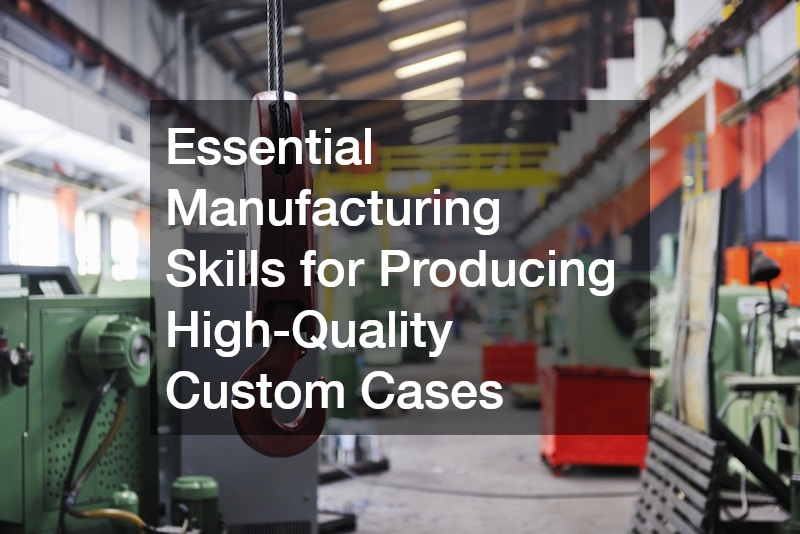In today’s competitive market, the demand for durable, tailored protective solutions has made custom cases an essential product across numerous industries. From safeguarding sensitive electronics to transporting specialized equipment, the quality of custom cases depends heavily on the manufacturing skills behind them. For a custom case manufacturer, mastering a range of technical and practical skills is vital to meet the precise needs of clients and maintain high standards. This blog explores the essential manufacturing skills required to produce high-quality custom cases and why they matter in delivering exceptional products.
Understanding Materials and Their Properties
A foundational skill for any custom case manufacturer is a deep understanding of materials. Cases are typically made from materials like polypropylene, ABS plastic, aluminum, and various foam inserts, each offering distinct benefits and challenges.
Knowing the strengths and weaknesses of these materials allows manufacturers to select the best options based on durability, weight, environmental resistance, and cost-effectiveness.
For instance, a custom case intended for outdoor use may require weather-resistant materials that can withstand extreme temperatures, moisture, and impact. On the other hand, cases designed for electronic equipment need materials that provide excellent shock absorption and electrostatic discharge protection. Mastery of material science ensures the case not only protects its contents but also stands the test of time and use.
Precision in Design and Engineering
Producing a custom case that fits specific equipment or tools demands precision design and engineering skills. Manufacturers must be adept at translating client requirements into detailed technical drawings and 3D models. This process involves measuring dimensions accurately, understanding weight distribution, and planning for functional features like latches, handles, and hinges.
Advanced computer-aided design (CAD) software is frequently used to create prototypes and refine designs before production. Proficiency with these digital tools enables manufacturers to simulate stress points, optimize material usage, and foresee potential manufacturing challenges. This level of precision helps reduce waste, lower production costs, and ensure the final product meets exact specifications.
Mastery of Fabrication Techniques
Custom case manufacturing requires expertise in a variety of fabrication methods. Techniques such as injection molding, thermoforming, CNC machining, and metalworking are common depending on the case’s material and complexity. Skilled operators must understand the nuances of each method to produce consistent, high-quality parts.
Injection molding, for example, is widely used for creating plastic case shells. Operators must manage mold temperature, injection pressure, and cooling times to prevent defects like warping or incomplete fills. Similarly, foam inserts require precision cutting and shaping, often using CNC routers or water jet cutting, to fit equipment snugly and provide maximum protection. Mastery of these fabrication techniques ensures every component of the custom case is built to the highest standards.
Quality Control and Testing Expertise
Another essential skill is the ability to conduct rigorous quality control and testing throughout the manufacturing process. A reputable custom case manufacturer implements systematic inspections at multiple stages to detect flaws early. This includes visual inspections, dimensional checks, and functional tests of moving parts like hinges and latches.
Additionally, high-quality custom cases undergo durability testing such as drop tests, impact resistance evaluations, and waterproof sealing verification. Familiarity with industry standards and testing protocols is crucial to certify that cases meet or exceed customer expectations. Skilled quality control professionals help prevent costly returns, maintain brand reputation, and ensure product reliability in real-world conditions.
Effective Project Management and Communication
Manufacturing high-quality custom cases is often a complex process involving multiple teams and stages, making effective project management a critical skill. Coordinating design, material sourcing, fabrication, assembly, and shipping requires meticulous planning and communication to keep projects on schedule and within budget.
A successful custom case manufacturer fosters open communication channels between engineers, production staff, and clients. This collaboration helps address design adjustments, troubleshoot production issues, and incorporate feedback promptly. Strong project management also involves risk assessment and contingency planning to handle unexpected delays or supply chain disruptions without compromising quality.
Commitment to Continuous Learning and Innovation
The manufacturing landscape is constantly evolving with new materials, technologies, and customer demands. For custom case manufacturers, a commitment to continuous learning and innovation is essential. Staying updated with industry trends, attending trade shows, and investing in employee training ensures the workforce remains skilled and adaptable.
Innovations such as advanced composite materials, automation in fabrication, and smart packaging solutions are reshaping how custom cases are made. Manufacturers who embrace these changes can offer more durable, lighter, and smarter products, giving them a competitive edge in the market. Encouraging a culture of innovation also drives process improvements that enhance efficiency and reduce waste.
Producing high-quality custom cases is a complex endeavor that demands a diverse set of manufacturing skills. From material knowledge and precision design to advanced fabrication techniques and rigorous quality control, each skill plays a vital role in delivering products that protect valuable equipment and satisfy client needs. Moreover, strong project management and a commitment to innovation enable custom case manufacturers to adapt and excel in a competitive industry.
For businesses seeking reliable and tailored protective solutions, partnering with a skilled custom case manufacturer ensures not only superior product quality but also seamless project execution. Investing in these essential manufacturing skills ultimately leads to durability, customer satisfaction, and long-term success in the custom case market.


